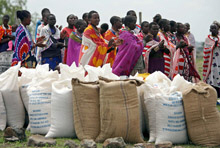
Typical street scene in Santa Ana, El Salvador. (Photo: iStock)
IMF Survey: Tough Policy Choices as Low-Income Countries Gain Ground
August 25, 2008
Many of the world's low-income countries are again having to make tough policy choices.

Proliferation of donors, projects makes aid governance problematic, says article in new issue of Finance & Development (photo: Radhu Sigheti/Reuters)
POVERTY REDUCTION AGENDA
With food and oil prices touching record highs in recent months and global growth on a down trend, countries battling to reduce poverty levels need to juggle to curb inflation, while maintaining growth and social spending.
Ahead of a series of prominent international meetings on help for developing countries, starting in Accra, Ghana in early September, the latest issue of the IMF's quarterly magazine Finance & Development examines key issues facing low-income countries today.
The IMF's Masood Ahmed, in an overview, identifies four major macroeconomic challenges that low-income countries are grappling with and outlines possible approaches to tackle them. The downturn comes at a time when things were starting to look better for low-income countries, particularly in sub-Saharan Africa, where some economies are now successfully attracting international investors and are seen as a new tier of "frontier" emerging markets, an issue examined by the IMF's David Nellor.
Aid fragmentation
Three articles explore emerging trends, and problems, in the aid business and how to transform the governance of aid. Eckhard Deutscher and Sara Fyson of the Organization for Economic Cooperation and Development examine the changing landscape of donors and find that aid fragmentation poses a major problem, with a proliferation of donors straining the government apparatus of some smaller countries.
Aid unpredictability is another major difficulty, say Oya Celasun and Jan Walliser. It prevents countries from making full and good use of the money. The 2005 Paris Declaration on Aid Effectiveness is a dynamic, action-oriented road map that attempts to remedy these and other problems in the delivery of aid, Elaine Venter writes, but it still remains donor-centric.
Articles in the low-income package include:
The Next Frontier
Masood Ahmed
Low-income countries gain ground in a globalized world, but they still face major challenges.
Improving the Effectiveness of Aid
Eckhard Deutscher and Sara Fyson
A proliferation of donors and projects has made the governance of aid more problematic.
Point of View
A Work in Progress
Elaine Venter
The Paris Declaration renews the focus on aid reform but is still donor-centric.
Dialogue Box
Antoinette Sayeh, Domenico Lombardi, Kumi Naidoo, Andrew Kumbatira, Eveline Herfkens, Roy Cullen, Enrique V. Iglesias
F&D asked respondents "What's the single thing most likely to double living standards in poor countries over the next decade?"
The Rise of Africa's "Frontier" Markets
David C. L. Nellor
A number of sub-Saharan countries are beginning to attract overseas investors to their financial markets.
Managing Aid Surprises
Oya Celasun and Jan Walliser
Developing countries cannot make full use of aid when it is unpredictable.
Mobilizing Revenue
Sanjeev Gupta and Shamsuddin Tareq
Strengthening domestic revenue bases is key to creating fiscal space for Africa's developmental needs.
Comments on this article should be sent to imfsurvey@imf.org







